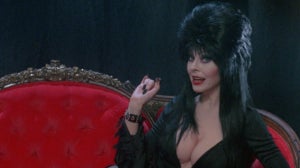
Criticism of toxic masculinity has permeated throughout world cinema over the past decade. In Indonesia, writer-director Edwin’s Vengeance is Mine, All Others Pay Cash is a recent example of a film that challenges gender stereotypes and traditional male values. However, there’s a breadth of existing East Asian cinema that, whether intentionally or not, features male characters that could fall under the bracket of toxic masculinity. From tales of unruly yakuza to downtrodden salarymen, below are a handful of East Asian films that effectively explore different facets of masculinity.
Afraid to Die (Yasuzo Masumura, 1960)
The films of pre-Japanese New Wave auteur Yasuzo Masumura are notable for their female-driven narratives, but with the gangster flick Afraid to Die, the director focuses on a frankly detestable male lead. The somewhat infamous Yukio Mishima plays Takeo, a yakuza fresh out of prison and on the run from a rival gang. The hard-as-nails gangster might look the part as he arrogantly struts around in a weathered leather jacket, but this appearance is merely a façade, as he’s actually teeming with fear.
Surviving a botched assassination leaves Takeo understandably paranoid as he awaits another attempt on his life. However, the word ‘scared’ doesn’t come into a yakuza’s vocabulary, so despite his unease, the gangster is forced to put on bravado around his peers. It isn’t long before others notice Takeo’s underlying angst, as his urge to run from danger calls into question his commitment to the yakuza lifestyle along with his manhood.
Although intended to be a typical yakuza protagonist, Takeo is a notably abhorrent figure. Trapped in a situation of his own making, Mishima’s man on the run takes out his anger and frustration on the women in his life, more than once striking his girlfriend, Yoshie (Ayako Wakao), a defiant figure who refuses to be controlled. Through the characterisation of Takeo, Masumura ditches the glamorised yakuza anti-hero in favour of a deeply flawed thug at the mercy of a violent and inherently male world.
https://youtu.be/qIPjr-lja_A
The Chinese Boxer (Jimmy Wang Yu, 1970)
Shaw Brothers martial arts films are well-known for their ultra-macho heroes who never say die in the face of adversity. Jimmy Wang Yu’s The Chinese Boxer has one such hero in Lei Ming, a kung fu student seeking to avenge his master who’s fallen at the hands of Japanese karate experts. This classic piece of Hong Kong cinema is notable for its depiction of Ming, an early example of the male protagonist archetype that would dominate the studios’ films for the next decade.
Until the late 1960s, female stars like Yam Kim-Fair and Cheng Pei-Pei ruled Hong Kong cinema. However, prolific director Chang Cheh’s The One-Armed Swordsman (1967) was the first of several Shaw Brothers productions to feature a new type of male lead based on the principle of yanggang (staunch masculinity). Audiences connected with hard-edged, violent, and physically imposing heroes, as the likes of David Chiang, Ti Lung, and Jimmy Wang Yu gained popularity.[1]
Ming typifies this brutal male protagonist both in his characterisation and the hardships he faces; male heroes would generally be confronted with the death of either a father figure or brothers who would be avenged through valiant sacrifice. In today’s cinema, a central character such as Ming might be labelled as flawed, cliché, and even toxic. Yet, there remains a palpable appeal to the red-blooded, romanticised male hero that has since become synonymous with the Shaw Brothers martial arts films.
https://youtu.be/tVab0AXHFbY
The Terrorizers (Edward Yang, 1986)
The late Edward Yang is indisputably one of the finest Taiwanese filmmakers of all time, with his intimate works touching the souls of many. With The Terrorizers, the director presents a sprawling narrative that explores the intersecting lives of strangers in then-contemporary Taipei. Through one of these strangers, the working stiff Li Lizhong (Li-Chun Lee), we see the effects of male pressures and expectations concerning work, marriage, and intimacy.
Li’s creed is that to be deemed a success and attain happiness in life, a man must prosper in a respectable career. He remarks at one point, “For men, a successful career is everything. Nothing else really matters.” However, this obsessive pursuit of living up to misplaced masculine ideals leads Li to neglect the emotional needs of his wife, Zhou (Cora Miao), and betray his friends. In doing so, he typifies many men in modern society who judge self-worth on material gains instead of personal fulfilment.
When confronted about their separation, Zhou simply tells her husband that he “doesn’t understand” what’s wrong, implying that his twisted ideals prevent him from seeing that their marriage is emotionally barren. Ultimately, Li’s inability to see past and live up to shallow, often unattainable male standards takes him down a desperate and violent path. Unable to communicate his worries and vulnerabilities, he spirals into isolation and self-destruction.
https://youtu.be/Caml5XcZ4ZM
Burning (Lee Chang-dong, 2018)
To say that toxic masculinity is the only subtextual element explored in Lee Chang-dong’s masterful feature, Burning, would undermine the film’s critiques of contemporary South Korean society and modern classism. However, fundamental masculinity traits play a vital role in the acclaimed director’s methodically paced thriller, which sees the lives of Jong-su (Yoo Ah-in) and Ben (Steven Yeun) intersect after both men befriend the enigmatic Shin Hae-mi (Jeon Jong-seo).
An early romantic encounter between Jong-su and Hae-mi results in the young man becoming infatuated, viewing the woman as a means of escape from his impoverished, farm-bound life. Ben, by contrast, attracts Hae-mi effortlessly, despite appearing to view her as no more than a pretty plaything. Older and wealthier, Ben is the envy of Jong-su, who sees him as a rival for Hae-mi’s affections. The tenuous tension between the two men allows for the subtle scrutiny of male sexual entitlement and jealousy, which ultimately ends in violence.
While overtly critical of its male characters, Burning’s most damming critique of South Korean society comes through Hae-mi. Crippled by credit card debt, financial desperation sees her working an exploitative job that depends on her being objectified – an unfortunate reality for many women. Belittled, judged, and idealised by the film’s leads, Hae-mi cuts a lonely and emotionally starved figure suffocated by the realities of a patriarchal society.
https://youtu.be/oihHs2Errwk
[1] Desser, David (2005). ‘Making Movies Male: Zhang Che and the Shaw Brothers Martial Arts Movies, 1965-1975’ in, Pang, Laikwan and Wong, Day (ed.) Masculinities and Hong Kong Cinema, Hong Kong: Hong Kong University Press, pp.17-34.









